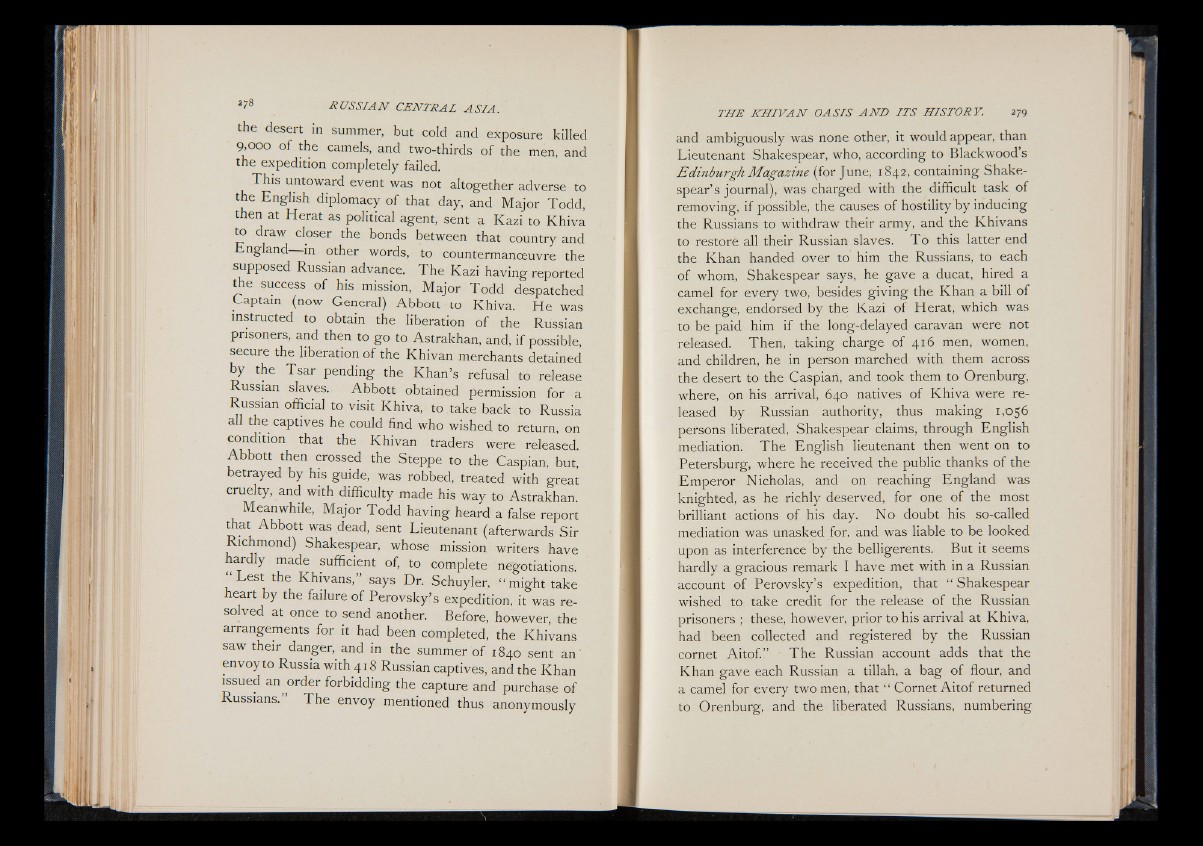
the desert in summer, but cold and exposure killed
9,000 of the camels, and two-thirds of the men, and
the expedition completely failed.
This untoward event was not altogether adverse to
the English diplomacy of that day, and Major Todd,
then at Herat as political agent, sent a Kazi to Khiva
to draw closer the bonds between that country and
England— in other words, to countermanceuvre the
supposed Russian advance. The Kazi having reported
the success of his mission, Major Todd despatched
Captain (now General) Abbott to Khiva. He was
instructed to obtain the liberation of the Russian
prisoners, and then to go to Astrakhan, and, if possible,
secure the liberation of the Khivan merchants detained
by the Tsar pending the Khan’s refusal to release
Russian slaves. Abbott obtained permission for a
Russian official to visit Khiva, to take back to Russia
all the captives he could find who wished to return, on
condition that the Khivan traders were released.
Abbott then crossed the Steppe to the Caspian, but,
etrayed by his guide, was robbed, treated with great
cruelty, and with difficulty made his way to Astrakhan
Meanwhile, Major Todd having heard a false report
that Abbott was dead, sent Lieutenant (afterwards Sir
Richmond) Shakespear, whose mission writers have
hardly made sufficient of, to complete negotiations.
Lest the Khivans, says Dr. Schuyler, “ might take
heart by the failure o f Perovsky’ s expedition, it was resolved
at once to send another. Before, however, the
arrangements for it had been completed, the Khivans
saw their danger, and in the summer o f 1840 sent an
envoy to Russia with 418 Russian captives, and the Khan
issued an order forbidding the capture and purchase of
Russians.” The envoy mentioned thus anonymously
and ambiguously was none other, it would appear, than
Lieutenant Shakespear, who, according to Blackwood’s
Edinburgh Magazine (for June, 1842, containing Shake-
spear’s journal), was charged with the difficult task of
removing, if possible, the causes of hostility by inducing
the Russians to withdraw their army, and the Khivans
to restore all their Russian slaves. T o this latter end
the Khan handed over to him the Russians, to each
of whom, Shakespear says, he gave a ducat, hired a
camel for every two, besides giving the Khan a bill of
exchange, endorsed by the Kazi of Herat, which was
to be paid him if the long-delayed caravan were not
released. Then, taking charge of 416 men, women,
and children, he in person marched with them across
the desert to the Caspian, and took them to Orenburg,
where, on his arrival, 640 natives of Khiva were released
by Russian authority, thus making 1,056
pefsons liberated, Shakespear claims, through English
mediation. The English lieutenant then went on to
Petersburg, where he received the public thanks of the
Emperor Nicholas, and on reaching England was
knighted, as he richly deserved, for one of the most
brilliant actions of his day. No doubt his so-called
mediation was unasked for, and was liable to be looked
upon as interference by the belligerents. But it seems
hardly a gracious remark I have met with in a Russian
account of Perovsky’s expedition, that “ Shakespear
wished to take credit for the release of the Russian
prisoners ; these, however, prior to his arrival at Khiva,
had been collected and registered by the Russian
cornet Aitof.” The Russian account adds that the
Khan gave each Russian a tillah, a bag of flour, and
a camel for every two men, that “ Cornet Aitof returned
to Orenburg, and the liberated Russians, numbering